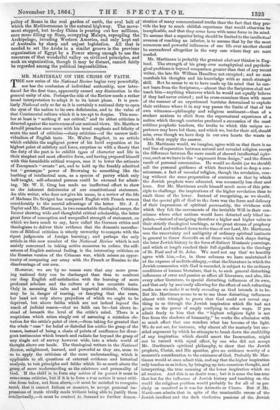EARL RUSSELL ON AFRICA.
EARL RUSSELL, in the somewhat discursive speech which he made on Friday at Aberdeen, laid his finger on a very striking blot in the political map of the world. We are very fond of talking of the "irresistible march of civili- zation," of demonstrating the progress of the whole human race, and of predicting the day when the great family of man, at last educated, at last at peace, at last reduced under the dominion of law, shall commence the career which some theo- logians who cannot realize that God is reigning now are accustomed to prophesy under the name of the millennium. All this while it is as certain as anything in politics well can be that progress is confined to a very limited section of mankind, that there are races which never advance, but perish, like the Tasmanians, in the effort to begin, that the Asiatic half of the human family has been for ages stationary, that the African fourth has either not advanced or has positively receded. Earl Russell did not touch upon the Tasmanians, regarding that case as hopeless, or upon Asia, probably thinking, as we do, that Europe has commenced in that region its great work of ploughshare, ploughing up and breaking the soil in readiness for some new seed, but he did touch the African point. The great Whig is never very happy in these allusive speeches, his ideas, like gold, wanting to be beaten out thin before you can see the light through them, but the thought in his mind seems to have been in this wise :—The Africans are men, but they have not ad- vanced; if they never advance what proof have we that ad- vance is the destiny of mankind ? Yet it must be, or true Whiner), has no foundation, consequently Africans must some time or other take their place in the general movement of civilization. So he affirmed that light " was" to shine in that quarter of the world, and mentioned that Captain Speke and Dr. Livingstone thought so too, and reported a decrease in the slave trade, and altogether managed to make his point in a somewhat feeble and confused, but very suggestive way. The speculation seems rather vague, but the hiatus in the social maps, the existence of an entire continent without any trace of native civilization present or visibly to come, is a very curious one, and it is worth while to examine whether there is any ground for thinking it possible that Earl Russell's conviction should be realized within any time or in any mode on which politicians can rea- sonably speculate. The point, be it remembered, is not the old subject of controversy—the capacity of the African— upon which nothing but time can teach mankind anything new, but the possibility of extending civilization to a certain geographical region peopled or owned by the race who may at the time people or own it. It may for aught anybody can tell be the destiny of the African tribes to die out like those of the South Sea and Australia, or to be conquered like the population of the Roman world by races more vigorous than themselves, or to be elevated like the people of the Highlands of Scotland from tattooed savages hunting deer through the mist into a people able to hold its own in the hottest war of civilization. The question is not of capacity, on which human beings never judge accurately, but of political pro- babilities. Is there a reasonable hope that modern society will ever see Africa reduced under the dominion of law ? Experience is against it, for the one great African State, Egypt, has, instead of rising, or even remaining stationary, receded to comparative barbarism, Abyssinia has been conquered by savages, Numidia, with its high civilization, has been swallowed again by the desert, and the only white spot in the darkness, the colony of the Cape, possesses, to all appearance, no expansive force. Geography, too, is against Earl Russell's dream. The continent is terribly vast and pierced by very few navigable rivers, its climate in most places repels the only race active-minded enough to explore unknown interiors, its productions do not tempt traders as those of Asia have done, and its levels present difficulties in the way of the rapid communication which modern society loves.
It has proved very difficult, almost impossible, to pierce into Central Asia, and there seems till the world is a little more exhausted of its resources still less temptation to pierce into Central Africa. Of course science may reduce the physical difficulty to nothing. We may one day drive through the air, feeding some new motor by rapid dips into terrestrial sta- tions, or we may discover some mode of rapid progression to which levels are no obstacle, but dreams or halluci- nations of that sort are wholly beyond the range of political foresight. And yet in spite of the decadence of the only African civilization of which the moderns have any knowledge, of the death of all ancient settle- ments on the fringe of the continent, of the climate, and of the physical configuration of the soil, we suspect that it is possible to furnish Earl Russell with a reason for the faith that is in him. Without entering into his vast speculation about the destinies of different continents, we can still point out one mode in which the civilization of Africa may be accomplished, and if there is one visible the idea of impossi- bility may be safely rejected.
We hold that in Africa, as in Asia and Europe, the first necessity of civilization is the dominion of law, and this can be secured at first only by external force. The point from which that force may be most easily applied is clearly the valley of the most navigable river, and it is to the future owners of Egypt that Africa must look for the means of com- mencing a new career. The suppression of the slave trade is good because it secures internal peace, the so-called wars being slave hunts, and colonization is good because it reduces the sum of work to be done, but neither of these devices really affect the interior. A strong Power, English, French, or Italian, once in possession of Egypt could, how- ever, and to judge by Indian analogy probably would, work steadily down the valley of the Nile towards the heart of the continent, discovering everywhere products which would pay the expenses of expeditions, and enforcing for its own gain the external order without which races do not advance. Such a Power would have at its disposal the only race which has ever warred successfully in Africa, the only colonists who have ever exercised a perceptible influence on the blood of the African tribes. The masters of Egypt have always been the masters of Arabia, of tribes who, as soldiers, are as superior to the sepoys as the sepoys are to Chinese, who emi- grate by thousands wherever service is open, who have once entered half the countries of Asia and Africa, and who, crossed with the African, produce a race altogether beyond the negro in capacity for rapid civilization. The Fellah of Egypt is Arab slightly intermixed, the tribes who in the south stand up to British soldiers are Arab much intermixed. Once out of Arabia the Arab multiplies fast. He filled up the gap he himself had made in Numidia, and Asiatic Turkey, and South-Western Persia, and the history of Mohammedan Spain shows how far he is capable of civilization. An active trader, a curiously able financier, athletic, temperate, and courageous, the Arab can live anywhere as readily as the Jew, whose presence in every country is sufficient proof of itself that there is no climate which can permanently alter the character of immigrants from another soil. Guided by European energy the Arab might become the most successful of colonists, extend his rule slowly and surely from Cairo to the frontier of his degenerate kinsmen, i. e., through the richest and most fertile portions of the continent. He can even live, though he probably cannot be civilized, in the Great Desert, which once explored will probably turn out to be as little a desert in the true sense of the term as is Arabia itself. General Daumas, perhaps the ablest man the French ever had in Algeria, says that he hunted for the true Sahara for years, but he never succeeded in finding it, never saw the region in which human beings and palm trees could not be made to live. It would not take a century for any strong Power which had gained the confidence of the Arabs to push its suzerainty below the equator, or two to enforce external order from Cairo to British Kaffraria. The mere extent of country which seems so frightful is less by one-half than the ter- ritories conquered by Spain between 1497 and 1560, and Spain contained fewer people than Arabia, had not the aid of steam, and could not avail herself of that process which, forgotten for eight hundred years, is again recommencing—the emigration of Asiatic races. From the birth of Christ to the fall of Con- stantinople those races were in perpetual movement, filling up slowly but inevitably the void spaces left in the west and north of Europe, the hiatus created by the slaveholding
policy of Rome in the real garden of earth, the oval belt of which the Mediterranean is the natural highway. The move- ment stopped, but to-day China is pouring out her millions, once more filling up Siam, occupying Malaya, repeopling the Archipelago, invading Western America, and only kept out of Australia by sharp and unjust legislation. All that is needed to set the Arabs in a similar groove is the previous organization of Egypt by a Power strong enough to use the resources of that wonderful valley on civilized principles, and such an organization, though it may be distant, cannot fairly be regarded among the political impossibilities.































 Previous page
Previous page